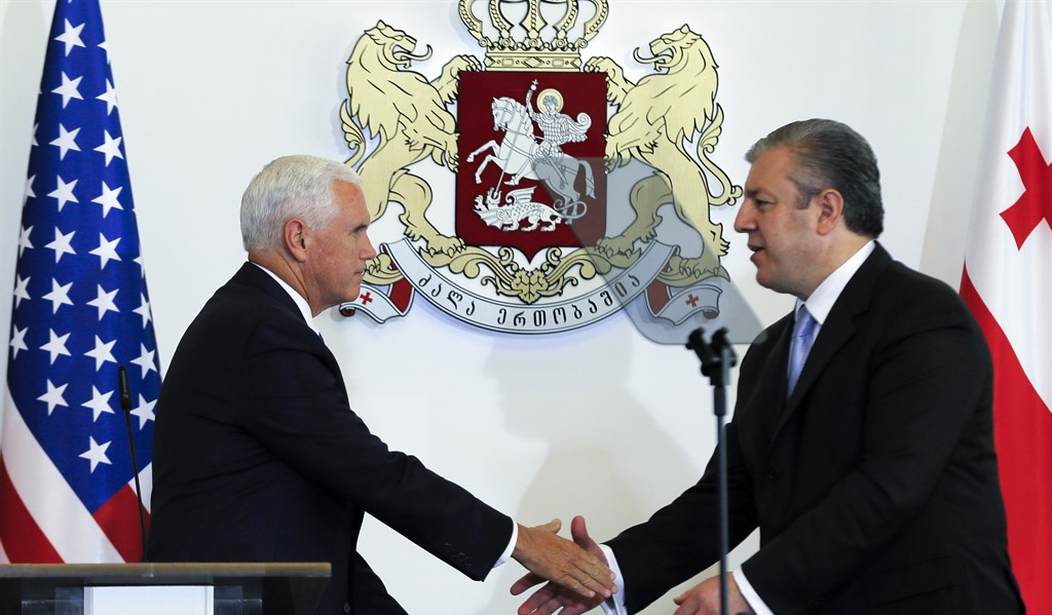The Trump administration may have expressed a desire to improve relations with Russia, but Mike Pence has spent the last few days sticking a thumb in Vladimir Putin’s eye. Just days after Russia announced a wholesale expulsion of US diplomatic personnel, the vice president visited the former Soviet republic of Georgia, where Russian troops still occupy areas seized in 2008. Pence pledged to stand by Georgia and declared the Trump administration’s support for Georgia’s bid to join NATO.
If this sounds familiar, it should:
Vice President Mike Pence said the U.S. “strongly” supports Georgia’s ambition of joining NATO, even as Russia remains hostile to the military alliance expanding its influence in Moscow’s former Soviet backyard.
“We see Georgia as a key strategic partner and stand by your territorial integrity and your aspirations to become a member of the North Atlantic Treaty Organization,” Pence said at talks with Prime Minister Giorgi Kvirikashvili in the Georgian capital, Tbilisi, on Tuesday. U.S. President Donald Trump “asked me to extend greetings to you this morning and to say we are with you,” Pence said.
The vice president is also attending joint military exercises involving as many as 800 Georgian and 1,600 U.S. troops during his visit. The Noble Partner 2017 drills, which also include German, U.K., Turkish, Slovenian, Ukrainian and Armenian forces, are the largest in the Caucasus republic since Georgia fought a brief war with Russia in 2008 over the breakaway regions of Abkhazia and South Ossetia.
Pence visited the Baltic states previous to his arrival in Tbilisi, where he emphasized US support against Russian aggression. His message in Tbilisi is only slightly more subtle, and it’s going to be heard loud and clear in Moscow.
That’s not the reason it should sound familiar, though. The Russian incursion into Abkhazia and South Ossetia came after the Bush administration made overtures to bring Georgia into NATO, too, as Vladimir Putin responded by going to war with Georgia to seize the two provinces before Georgia had access to an Article V intervention. The Bush administration got tough with Putin at that point, but Barack Obama and Hillary Clinton reversed that policy with their infamous “reset button” in March 2009, leaving the occupation of Abkhazia and South Ossetia as a fait accompli. Their efforts to appease Putin failed spectacularly in Ukraine five years later, when a push from European nations to get Ukraine to realign both politically and economically to the West triggered the same kind of response.
Pence wants to indicate that the Trump administration plans to get tougher with Putin than Barack Obama did, which isn’t hard to do. Georgia will certainly be happy to get back on the US nat-sec radar screen, but this ploy has considerable risk for both Georgia and NATO. Putin has already demonstrated that he’s willing to roll troops over the border to keep the West from setting up camp on Russia’s borders, at least more than they already do in Poland. Putin just got slapped in Montenegro on NATO expansion, but that was a lower-stakes standoff as the Adriatic nation is far from Russian borders. On the other hand, it might serve notice to Putin that his attempts at provocations in the Baltic will get answered in the always-fractious Caucasus, and that the US will not sit still again for Putin’s claims of championing ethnic Russian enclaves elsewhere.
In another signal to Putin, Pence declared that Trump will soon sign the sanctions bill that passed with veto-proof majorities:
Pence’s European trip comes several days after the U.S. Senate voted last week to approve the new financial sanctions against Moscow. The legislation bars U.S. President Donald Trump from easing or waiving the penalties on Russia unless Congress agrees.
Pence told reporters on Tuesday that Trump would sign a bill on a new package of U.S. sanctions against Russia, adding the package was “improved significantly.”
The bill underwent revisions to address concerns voiced by American oil and natural gas companies that sanctions specific to Russia’s energy sector could backfire on them to Moscow’s benefit. U.S. lawmakers said they also made adjustments so the sanctions on Russia’s energy sector didn’t undercut the ability of U.S. allies in Europe to get access to oil and gas resources outside of Russia.
If Putin interfered with the 2016 election with its specific outcome in mind, it’s not exactly paying off.
Update: Let’s discuss another aspect of this idea. NATO is a fairly contiguous group of countries which are relatively easy to defend, in terms of lines of communication and supply. The toughest member to support would probably be Turkey, although some troop movements could be possible through Greece and Bulgaria if needed, and the Mediterranean Sea gives the West broad access if northern Africa doesn’t become too hostile. Note, however, where Georgia is on the map — all the way on the other side of Turkey, who has become a lot less reliable over the last few years as an ally, with Iran close by. If called to respond to a Russian incursion under Article V, NATO would have no easy task in getting to the front with any force, while the Russians could roll across Georgia rather quickly.
This looks like a bad idea, even if it’s just a tit-for-tat provocation in answer to the Russians’ activities near the Baltic states …. maybe especially bad for that purpose.








Join the conversation as a VIP Member